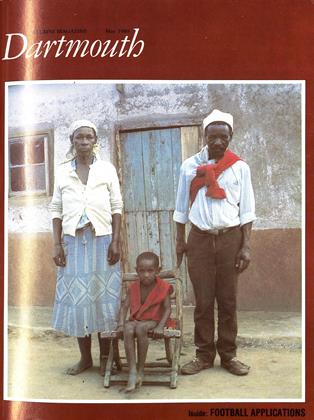Twice a week, the half-dozen members of the Kosher Ko-op gather around a table, say a hamotzi a blessing over bread and begin a meal at which certain dietary rules stipulated by orthodox Jewish law are observed. Over a recent dinner, Barry Eisenberg '82 shared his thoughts about kosher laws, which can be quite elaborate "but not really a problem once you understand them."
Because the preparation of meat and dairy products must be kept separate, a kosher kitchen must be carefully arranged. At the kitchen in the Hillel lounge at College Hall, there are two sets of plates, utensils, sinks, and cutting boards two sets of almost everything. And because both meat and milk products cannot be served at the same meal, particular attention has to be paid to the small print on labels. Mix-ups at the Ko-op are infrequent, although Eisenberg admitted that Hydrox cookies containing whey once were inadvertently served after a meat mealMembers share the shopping and cooking responsibilities, but last year hired a parttime student cook to help out. Meatproducts are ordered from a butcher inBoston.
Students who keep kosher sometimes eatat the student dining hall, but most do noteat meat there. "For the strictly orthodox," Eisenberg pointed out, "they don'tserve kosher at Thayer."
For Eisenberg, it is the discipline ofobserving rules and eating thoughtfullythat makes keeping kosher important. "Itbrings eating to another level, a level ofspirit and intellect," he said before theprayer, birzcat hamazon, concluding themeal. "It introduces thought into everyaspect of life."
 View Full Issue
View Full Issue
More From This Issue
-
 Cover Story
Cover StoryIn Two Worlds
May 1980 By Dan Nelson -
 Feature
FeatureIn Another Country
May 1980 By Beth Ann Baron -
 Article
ArticleAlchemist in Miniature
May 1980 By Michael Colacchio '80 -
 Article
ArticleScientific Humanist
May 1980 By M.B.R -
 Class Notes
Class Notes1978
May 1980 By JEFF IMMELT -
 Article
ArticlePainting Medicos Have Both "Life" and "Work"
May 1980 By D.C.G
Article
-
 Article
ArticleUNDERWEIGHT CLASSES SHOW GREAT GAINS
March, 1926 -
 Article
ArticleAlumni Service Honored
MAY 1972 -
 Article
ArticleCan a Man Be a Feminist?
NOVEMBER 1991 -
 Article
ArticleMasthead
Sept/Oct 2003 -
 Article
ArticleTwo More Years of Public Education?
March 1947 By Prof. HUGH MORRISON '26 -
 Article
ArticleEDITORIAL ON CO-OPERATION
JUNE 1932 By R. L. Woodcock '33

